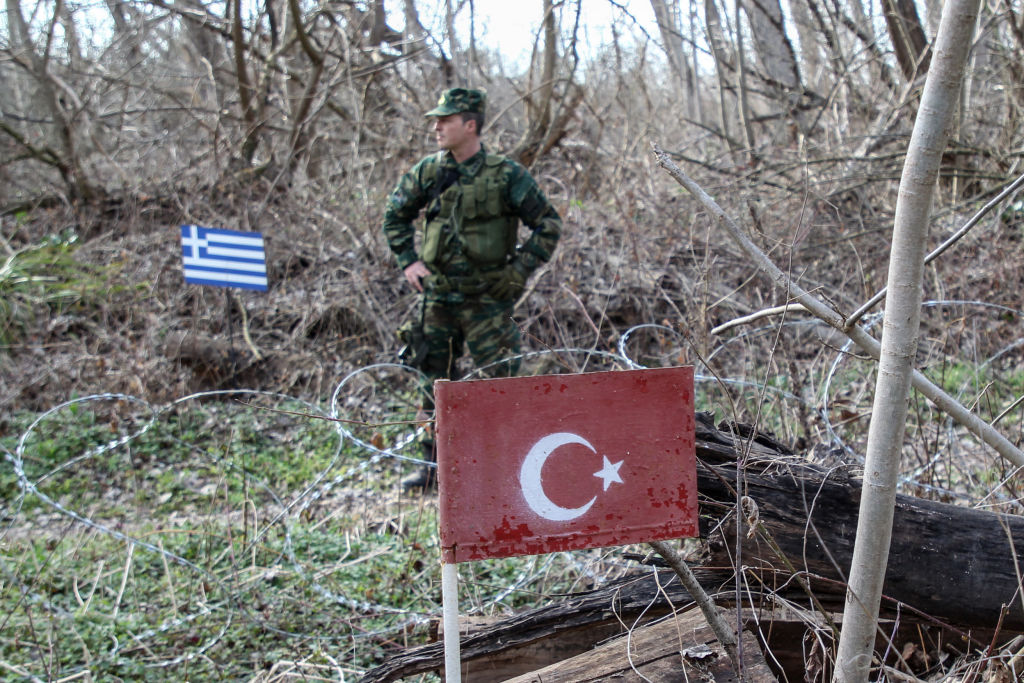
Greece’s naval modernisation program is another step in the nation’s attempts to secure strategic advantage in a region being shaken by shifting balances of power.
Its naval modernisation complements the government’s recent signing of defence cooperation agreements with Israel, Saudi Arabia and the Gulf states as the United States reduces its presence in the Middle East. This bloc aims to contain an aggressive Turkish republic.
Greece has spent the past summer reaching regional deals, including a US$1.65 billion defence contract with Israel and a defence agreement with the United Arab Emirates. A defence agreement with Saudi Arabia includes the loan of a US Patriot missile battery for Riyadh’s war in Yemen.
In February, Greece held the first Philia Forum with France, Saudi Arabia, Egypt, Cyprus, the UAE and Bahrain, and it held the annual Iniochos 2021 military exercises with the US, Israel, the UAE and Cyprus in April.
Greece has united a coalition of states worried about what they see as Turkey’s neo-Ottoman expansionist agenda marked by ambitious maritime claims, incursions into Syria and constant plays for leadership of the Muslim world. With the emergence of this coalition, Libya and Qatar are among Turkey’s few regional allies.
But Greece’s deepening engagement with the Eastern Mediterranean may carry risks to both its reputation and its sovereignty.
Clientelist networks throughout the Middle East have deepened the dependence of weaker states on Eastern Mediterranean powers, such as Saudi Arabia and the UAE, through financial and diplomatic support. Ingrained patronage systems in the two states ensure that political and economic power remains centralised in their elites. Can Greece avoid undue foreign influence from these regional powers?
Saudi Arabia’s history of corruption and human rights abuses, epitomised by the brutal killing of Jamal Khashoggi in 2018, has made many NATO countries think twice about engaging with Riyadh.
Internationally, Saudi Arabia has been criticised for its involvement in Yemen and human rights abuses domestically and abroad. This has led to the UK appeal court ruling that it’s illegal to grant licences to Saudi Arabia due to potential breaches of international humanitarian law. But that hasn’t stopped UK arms sales to Saudi Arabia. The US is reviewing its sale of arms to Saudi Arabia and the UAE, and has announced a review of its conventional arms transfer policy.
Saudi Arabia’s increasing reputational issues may sit uneasily with a nation that takes pride in being the birthplace of democracy, and whose electorate is sensitive to foreign interference.
Close engagement also raises questions about Greece’s apparent lack of engagement and leveraging of relationships with the EU, the UK and the US on its national security concerns.
Greece has strong relations with European nations, such as France and Italy, that share concerns about Turkish behaviour in the region, and it has a longstanding relationship with Europe through the EU and NATO. But this relationship has been strained by what Greece considers a lack of action against Turkish aggression. Greece believes Europe’s opting for diplomatic solutions to Turkey’s behaviour in the region has let it down.
According to some EU officials, Greece has lost faith in the EU’s will to deter Turkish aggression against Greek territory and in the region. And with a decreasing US presence in the Middle East, some argue that Greece has no option other than to turn to regional actors like Saudi Arabia and the UAE. That they are apparently willing to bankroll Greece with finance, supplies and equipment in the event of increased conflict adds to the attractiveness of this option.
While there are legitimate concerns about Greece’s engagement with the Middle East, its pragmatic approach is reflected in a Greek saying, ‘From outside the dance circle, you sing a lot of songs’.
Greece’s relationships with Middle Eastern powers may be pragmatic, but they shouldn’t come at the expense of its long-term interests as a democratic country and its historical alliances with the US and EU.

